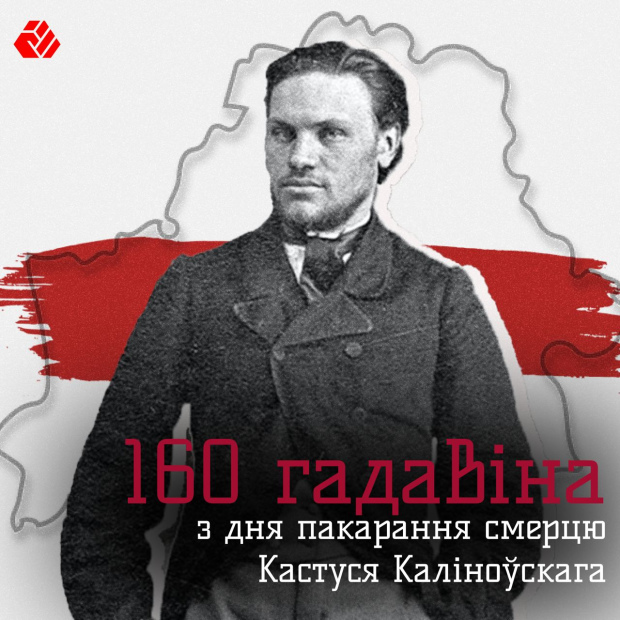On March 22nd, we commemorate the 160th anniversary of the execution of Kastus Kalinouski. Most Belarusians are familiar with this historical figure. Today, society's attitude towards him sharply divides into two camps.
For some, he is a national hero, while for others, he is a Pole who wanted to separate Belarusians from Russians. Recently, pro-Russian activists have waged a true war against the memory of Kastus Kalinouski. For example, this year they succeeded in renaming the gymnasium in Swisłocz, where Kastus Kalinouski studied and which was named in his honor. The museum composition and the monument to the famous Belarusian have also disappeared from there. Moreover, there is an ongoing effort to rename streets bearing Kalinouski's name. Yet, streets named after Kalinouski can be found in several Belarusian cities – from Hrodna to Mahilioŭ and from Rečyca to Sluck.
So who was Kastus Kalinouski, and why is it especially important for us to remember his struggle and sacrifice today?
Kastus Kalinouski was born in Mastaulany, in the Grodno region (now part of Poland), into a landless noble family. Historians disagree about Kalinouski's origin; both Poles and Lithuanians consider him their hero.
In the mid-19th century, our nation had not yet fully formed – this process was completed 50 years later. Nevertheless, Kalinouski can be considered a representative of the insurgent Belarusian nobility. Evidence of this is his position during the 1861-1863 uprising. Unlike most rebels, he addressed peasants in Belarusian and called on them to join the fight. Kalinouski belonged to the "red," radical wing of the uprising and advocated for land transfer to peasants, a democratic republic, and self-determination of the peoples of the Polish-Lithuanian Commonwealth.
In 1861, after returning from St. Petersburg, where he studied, Kalinouski began agitating among peasants. A year later, he issued the first newspaper in the Belarusian language, "Muzhytskaya prauda" ("Peasant Truth"). In 1864, after the practical defeat of the uprising, "Yaska-haspadar z-pad Vilni" (the newspaper pseudonym) was captured by the authorities and brought to trial.
On March 22, 1864, Kastus Kalinouski was hanged in Lukishki Square in Vilnius. Now, a wooden cross stands at this site. However, his grave remained unknown for many years. In 2017, after several excavations on the Gediminas Hill, where barracks of the tsarist army were once located, unknown burials were discovered. The remains were identified – one of the deceased turned out to be Kalinouski.
The burial ceremony, which took place on November 22, 2019, vividly highlighted the attitude towards the freedom fighter in modern Belarus. The honorary military guard of our country did not participate in the ceremony. And the official delegation was represented only by deputy prime ministers (presidents from Poland and Lithuania were present). Among those who came to the burial, ordinary people predominated, with Belarusian and white-red-white flags.
Today, the question of independence and internal freedom, as it was 160 years ago, sharply stands before the Belarusian people. The pressure from Russia is also keenly felt. Moscow leads in the political, cultural, and linguistic space of Belarus, and it has dragged our country into a war against Ukraine. Just as 160 years ago, the desire of Belarusians for freedom and independence destroys the neighbor from the East.
Once Kalinouski gave answers to today's questions. He addressed not the elite of society – the nobility but the ordinary Belarusians – the peasants who constituted the majority of our country's population.
It's time to hear him today.
"Brothers in the field, my dear peasants. From under the Moscow gallows I come to write to you, perhaps for the last time. It's bitter to leave our native land and you, my dear people. Breasts will ache, hearts will ache – but it's not a pity to perish for your truth. Just as the day does not go together with the night, true knowledge does not go together with Moscow's bondage. As long as it exists with us, we will have nothing, no truth, no wealth, and no real knowledge – they will twist us like a top not for our good, but for our destruction."
Your servant
Yaska-haspadar z-pad Vilni.
For some, he is a national hero, while for others, he is a Pole who wanted to separate Belarusians from Russians. Recently, pro-Russian activists have waged a true war against the memory of Kastus Kalinouski. For example, this year they succeeded in renaming the gymnasium in Swisłocz, where Kastus Kalinouski studied and which was named in his honor. The museum composition and the monument to the famous Belarusian have also disappeared from there. Moreover, there is an ongoing effort to rename streets bearing Kalinouski's name. Yet, streets named after Kalinouski can be found in several Belarusian cities – from Hrodna to Mahilioŭ and from Rečyca to Sluck.
So who was Kastus Kalinouski, and why is it especially important for us to remember his struggle and sacrifice today?
Kastus Kalinouski was born in Mastaulany, in the Grodno region (now part of Poland), into a landless noble family. Historians disagree about Kalinouski's origin; both Poles and Lithuanians consider him their hero.
In the mid-19th century, our nation had not yet fully formed – this process was completed 50 years later. Nevertheless, Kalinouski can be considered a representative of the insurgent Belarusian nobility. Evidence of this is his position during the 1861-1863 uprising. Unlike most rebels, he addressed peasants in Belarusian and called on them to join the fight. Kalinouski belonged to the "red," radical wing of the uprising and advocated for land transfer to peasants, a democratic republic, and self-determination of the peoples of the Polish-Lithuanian Commonwealth.
In 1861, after returning from St. Petersburg, where he studied, Kalinouski began agitating among peasants. A year later, he issued the first newspaper in the Belarusian language, "Muzhytskaya prauda" ("Peasant Truth"). In 1864, after the practical defeat of the uprising, "Yaska-haspadar z-pad Vilni" (the newspaper pseudonym) was captured by the authorities and brought to trial.
On March 22, 1864, Kastus Kalinouski was hanged in Lukishki Square in Vilnius. Now, a wooden cross stands at this site. However, his grave remained unknown for many years. In 2017, after several excavations on the Gediminas Hill, where barracks of the tsarist army were once located, unknown burials were discovered. The remains were identified – one of the deceased turned out to be Kalinouski.
The burial ceremony, which took place on November 22, 2019, vividly highlighted the attitude towards the freedom fighter in modern Belarus. The honorary military guard of our country did not participate in the ceremony. And the official delegation was represented only by deputy prime ministers (presidents from Poland and Lithuania were present). Among those who came to the burial, ordinary people predominated, with Belarusian and white-red-white flags.
Today, the question of independence and internal freedom, as it was 160 years ago, sharply stands before the Belarusian people. The pressure from Russia is also keenly felt. Moscow leads in the political, cultural, and linguistic space of Belarus, and it has dragged our country into a war against Ukraine. Just as 160 years ago, the desire of Belarusians for freedom and independence destroys the neighbor from the East.
Once Kalinouski gave answers to today's questions. He addressed not the elite of society – the nobility but the ordinary Belarusians – the peasants who constituted the majority of our country's population.
It's time to hear him today.
"Brothers in the field, my dear peasants. From under the Moscow gallows I come to write to you, perhaps for the last time. It's bitter to leave our native land and you, my dear people. Breasts will ache, hearts will ache – but it's not a pity to perish for your truth. Just as the day does not go together with the night, true knowledge does not go together with Moscow's bondage. As long as it exists with us, we will have nothing, no truth, no wealth, and no real knowledge – they will twist us like a top not for our good, but for our destruction."
Your servant
Yaska-haspadar z-pad Vilni.


 Continue
Continue
